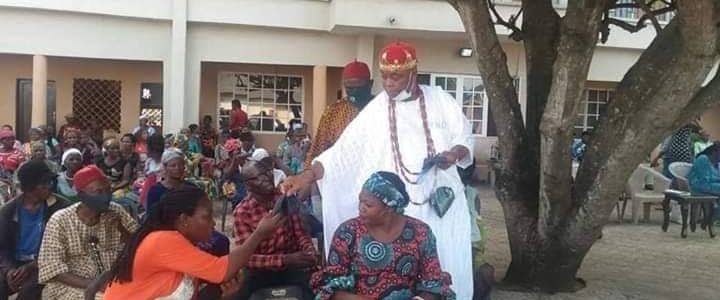
Like every other town in Anambra state and elsewhere, Nteje community which is the headquarters of Oyi Local Government Area was also affected by the Covid-19 lockdown order of the state. The hardship occasioned by the stay-at-home order made living difficult for most of the folks whose survival hangs precariously on a balance – those whose feeding rests squarely on daily toil.
Conscious of the effect of the lockdown on this category of people the Obiano government promptly made arrangements to ease the hardship through palliatives. Food items like rice, beans and condiments were issued out to all the 181 communities in the state to ameliorate the condition. To ensure that reasonable number of people was covered, especially the target beneficiaries (the youths and the aged), certain protocols were observed in ladling out the items.

One, the palliatives were not lumped together. They were shared in tranches. Two the protocols in sharing them were strictly adhered to. The aged were the first to be reached with two hundred bags of rice and condiments. Every community received the number with instruction to the town union Presidents General to ensure that those from age 70 and above were given.
Barely two weeks after the youths took delivery of four hundred bags per community. The idea to double their ration was perhaps because of their number. Again, attention was paid to the sharing details. The vulnerability status of the youths in the hundred and eighty one communities was taken into consideration in the sharing exercise. Though a far reaching exercise, but in the end not everybody was accommodated. As the effect of the lockdown and adapting to the “new normal” life stretched those not accommodated in the exercise sulked. Hunger and other forms of denials strain the limit of their patience, pushing a good number into begging for sustenance. Few public-spirited individuals saw the need to make interventions to shore up the lack.

Among those who did was Igwe Rowland Odegbo, (Aborgu 2 na Nteje), the traditional ruler of Nteje in Oyi local government of Anambra state. He felt the vicarious pains of those involved and made corresponding intervention. His palliatives came hard on the heels of the government’s. He ordered three hundred and fifty bags of Uncle Stan brand of rice to be shared in all the wards in Nteje. Stakeholders were asked to avail the committee empanelled to distribute the palliatives with twenty names, in some places ten, of vulnerable persons from each of the minor wards in Nteje. Twenty bags were given to members of the vigilante services. The distribution was in line with the protocols used in the sharing of the ones by the government. The only difference was that while the previous palliatives had target audience (the aged and the youth), the one by the Igwe cut across age. But all had one thing in common – the beneficiaries were all economically vulnerable as a result of the lockdown. The sharing, especially of the government’s palliatives, followed a patterned distributive channel. Four oldest people, three men and one woman, were selected from every minor ward in Nteje. This arrangement held for as long as there were elderly and economically vulnerable men in a particular ward otherwise women in similar circumstance were used in their stead.
A lot of people have since expressed surprise at the magnanimity of Igwe Odegbo. How thoughtful his actions. But many more who were privy to his many good works, especially in the area of attracting development to Nteje community were not surprised. Rather they pray for him to live long enough to do more. Echoing the sentiment, the President General of Nteje community Chief B.U Chinweze said that he was at once surprised and confident of the Igwe’s action. Surprised because he said he has lived long enough to witness successions to the igweship throne in Nteje and could not recall similar gesture. Confident because he was privy to some of the infrastructural development attracted to Nteje by Odegbo by leveraging on his position as the chairman of Anambra North traditional Council and his good relationship with the state government. “Since my over 60 years of life I have not seen where Igwe gave out palliatives to the people. They were always given. In fact, they receive from the people and could make demands when necessary”.
Chief Chinweze told of the many developments attracted to the community by the Igwe through his contacts. He listed the projects as the Akamanato- Nsugbe road, Ekeigwe –Nando road, Eziudo-Umunya- Umudioka road etc. Of the three only Eziudo-Umunya-Umudioka road is completed. The other two are ongoing. However the story of the Umudioka-Umunya-Nteje road is slightly different. According to Chinweze the road was awarded by the previous government and its construction started from the Umudioka end. By the time Governor Obiano took office work had progressed up to Umunya but did not cross to the Nteje stretch with its improvised bridge. It took persuasions and pleas from the Igwe for the Governor to direct effort towards its completion with the Nengo Bridge firmly fixed.
It is believed that Nteje is now on the fast lane of development and will not return to trudging on the road through acts of divisive politics. The youths, women, men, Ndi Nteje and friends of Nteje Aborgu should rally round their traditional ruler and support the development initiatives in the community. Communities thrive better in an atmosphere of peace and harmony.
Credit: Ejike Anyaduba
(Public Affairs Analyst, Abatete)
